Latest News Archive
Please select Category, Year, and then Month to display items
05 June 2018
Photo Supplied
 Archaeological excavations in the Wonderwerk Cave, north of Kuruman in the Northern Cape.
Archaeological excavations in the Wonderwerk Cave, north of Kuruman in the Northern Cape.
Research fellow Dr Lloyd Rossouw from the Department of Plant Sciences at the University of the Free State (UFS) recently published an article in the Nature Ecology and Evolution journal with Dr Michaela Ecker from the University of Toronto as lead author, and Dr James Brink, research fellow at the UFS Centre for Environmental Management. The findings described in “The palaeoecological context of the Oldowan-Acheulean in southern Africa” provides the first extensive paleoenvironmental sequence for the interior of southern Africa by applying a combination of methods for environmental reconstruction at Wonderwerk Cave, which have yielded multiple evidence of early human occupation dating back almost two million years ago.
Where water once was
The Wonderwerk Cave is found north of the Kuruman hills (situated in Northern Cape) a 140m long tube with a low ceiling. The surroundings are harsh. Semi-arid conditions allow for the survival of only hardy bushes, trees, and grasses. But during the Early Pleistocene, stepping out of the Wonderwerk Cave you would have been greeted by a completely different site, the researchers found. Using carbon and oxygen stable isotope analysis on the teeth of herbivores (Dr Ecker), fossil faunal abundance (Dr Brink), as well as the analysis of microscopic plant silica remains (phytoliths) excavated from fossil soils inside the cave (Dr Rossouw), the results show that ancient environments in the central interior of southern Africa were significantly wetter and housed a plant community unlike any other in the modern African savanna.
What difference does it make?
While East African research shows increasing aridity and the spread of summer-rainfall grasslands more than a million years ago, the results from this study indicate an interesting twist. During the same period, shifts in rainfall seasonality allowed for alternating summer and winter-rainfall grass occurrences coupled with prolonged wetlands, that remained major components of Early Pleistocene (more or less the period between one and two million years ago) environments in the central interior of southern Africa. That means our human ancestors were also living and evolving in environments other than the generally accepted open, arid grassland model.
UFS Winter Graduation Ceremony
2012-06-18
UFS awards record number of master’s degrees and doctorates
The University of the Free State (UFS) celebrated an increase in postgraduate successes with a record number of master’s degrees and doctorates that were awarded during the winter graduation ceremony at the Bloemfontein campus on Thursday 14 June 2012.
A total of 481 master’s degrees and 82 doctorates were awarded in two ceremonies in the Callie Human Centre on the Bloemfontein Campus. This is the most postgraduate qualifications to be awarded at a single graduation ceremony.
DiMTEC has reason to celebrate
|
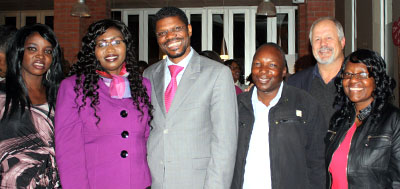 |
Dr Andries Jordaan (second from right) with some of the people who received their master's degrees. From the left are Kehinde Balogun, the couple Olive Chisola-Darris en Clement West Darris, and the couple Everson Ndlovu en Patience Sibongile Ndlovu.
Photo: Leatitia Pienaar
18 June 2012 |
|
DiMTEC had reason to celebrate at the winter graduation ceremony. The Disaster Management Training and Education Centre for Africa delivered a healthy crop of 32 master’s degrees and one doctorate.
This was the most master’s degrees that the centre has been awarded at one opportunity. The doctorate, however, was not at DiMTEC – Andries Jordaan, the director of the centre, obtained his Ph.D. in Agricultural Economy.
It was also the first time that two couples received their master’s degrees at the centre at the same time.
Speaking at the event, Dr Jordaan said former students of the centre were using their expertise worldwide. Some of them are in senior positions at the United Nations, in African countries, Afghanistan, and elsewhere. DiMTEC’s students hail from 17 African countries, including French-speaking countries.
“I am proud that we have a footprint right across Africa,” he said.
|
|
Three travel all the way from Europe for their MBAs
|
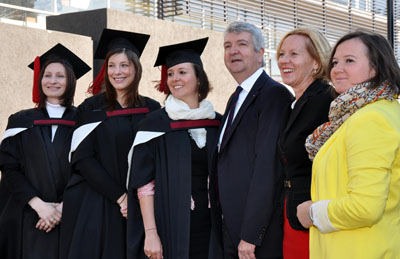 |
Smiles on an important day. From the left are: Kasina Baker, Friederike Hackelberg, and Johanna Kössler and her parents and sister.
Photo: Stephen Collett
18 June 2012 |
No distance, time or money could prevent three MBA graduates from Europe from attending the winter graduation ceremony in Bloemfontein. Two of them were exchange students who were so captivated by the university and the country that they undertook their MBA studies at the Business School.
Friederike Hackelberg of Bremen, Germany, was an exchange student in 2008 and extended her stay to do an MBA. Johanna Kössler of Bolzano, Italy, was also an exchange student who succumbed to the charms of the UFS and South Africa. She brought her parents, George and Nannie, and her sister, Magdalena, with her to attend the graduation ceremony.
Kasina Baker of Warsaw, Poland, began her studies while her husband was working in Kenya. She wanted to study at a quality institution and thus chose the UFS's Business School. |
|
Jessica gets three prestigious medals
|
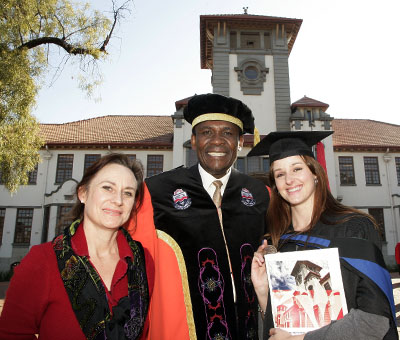 |
Jessica Potgieter (right) was the first student in almost three decades to receive three prestigious medals at the Winter Graduation Ceremony. She received the Dean's medal as best Master's student in the Faculty of Natural and Agricultural Sciences, the Senate Medal as best Master's student at the university and the Award for Scientific Achievement by the South African Association for the Advancement of Science. She is seen here with her mother, Mrs Ilse van Rhyn, and Dr Khotso Mokhele, Chancellor.
Photo: Johan Roux
18 June 2012 |
|
| Three daughters, three degrees for proud Kovsie mom |
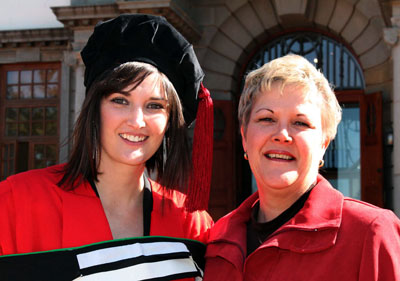 |
Liezel Alsemgeest and Adri Kotzé.
Photo: Leonie Bolleurs
18 June 2012 |
|
Adri Kotzé, Faculty Manager in the Faculty of Law, is a very proud parent. In the course of one year, all three her daughters will receive degrees from the University of the Free State (UFS). First in line is the eldest, who received her Ph.D. in Business Management at the Winter Graduation Ceremony.
Liezel is a lecturer in the Department of Business Management at the UFS, where she lectures, publishes and hopes to further her research in finance. “I enjoy working at the university because you have the freedom to do your own thing and focus on whatever you like,” she says.
The title of Liezel’s thesis is Customers’ perception of business units within an agricultural business in South Africa. Her focus is on the subjects of customer satisfaction and financial management, with a specific focus on the management of agricultural businesses.
Middle sister Corné will be graduating with a master’s degree in Occupational Therapy in December, while the youngest, Adéle, will receive her B.A. in Media Studies and Journalism at the Autumn Graduation Ceremony in 2013.
“I am very proud of all three my daughters,” says Adri.
|
|
| Sasolburg minister receives Dean's Medal for best master's degree in Theology |
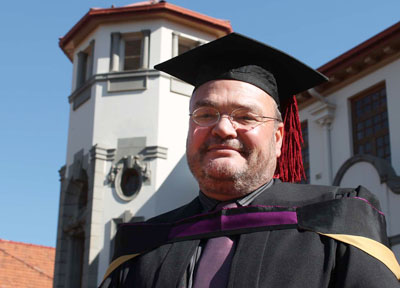 |
Rev. Frans Redelinghuys.
18 June 2012 |
|
Rev. Frans Redelinghuys of the Reformed Church in Sasolburg received his master’s degree in Theology at the University of the Free State’s Winter Graduation Ceremony. Rev. Redelinghuys was also awarded the Dean’s Medal as the best master’s degree student in the Faculty of Theology.
The focus of his dissertation is Spirituality. “My lecturers are all people who practice what they preach and they have shared their knowledge with me.,” he says.
“My studies also contributed to my personal development,” says Rev. Redelinghuys.
|
|
Student from the Netherlands receives degree at UFS Winter Graduation Ceremony
|
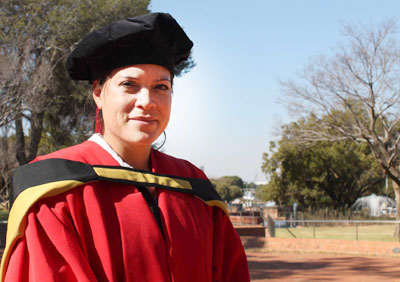 |
Deborah Van den Bosch-Heij.
Photo: Leonie Bolleurs
18 June 2012 |
|
Deborah Van den Bosch-Heij from the Netherlands was awarded a Ph.D. at the Winter Graduation Ceremony by the Faculty of Theology of the University of the Free State (UFS). Her thesis, Spirit and healing in Africa: A reformed pneumatological perspective, is an interdisciplinary investigation of the relationship between the Holy Spirit and healing in Southern Africa. The research addresses the need for a reviewed and contextually reformed approached to healing.
Deborah started her career as a minister at the Valkenburg Congregation of the Protestant Church in the Netherlands in 2001. She was appointed by the missionary department of her church to lecture at the Justo Mwale Theological University College in Lusaka, Zambia in 2005. It was here that she decided on the topic of her thesis. Prof. Rian Venter from the Department of Systematic Theology at the UFS, who is also involved at the Justo Mwale College, is Deborah’s promoter and assisted her in her studies whilst she was in the Netherlands. It was also Prof. Venter who made Deborah aware of the importance of interdisciplinary research.
|
|
Well-known judge's granddaughter receives degree
|
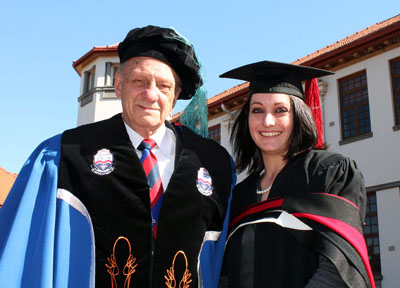 |
|
Judge Joos Hefer and Annelie de Man.
Photo: Leonie Bolleurs
|
|
Annelie de Man, a law researcher at the Supreme Court of Appeal in Bloemfontein received her master’s degree at the Winter Graduation Ceremony of the University of the Free State (UFS). She is Judge Joos Hefer’s granddaughter. Annelie was also awarded the Dean’s Medal as the best master’s degree student in the Faculty of Law.
“Today is one of the biggest highlights in my career,” says Annelie, who received exposure to the field of law from a young age.
In September, she will be leaving for Italy to study for a master’s degree in European Human Rights at the European Inter University.
|
|